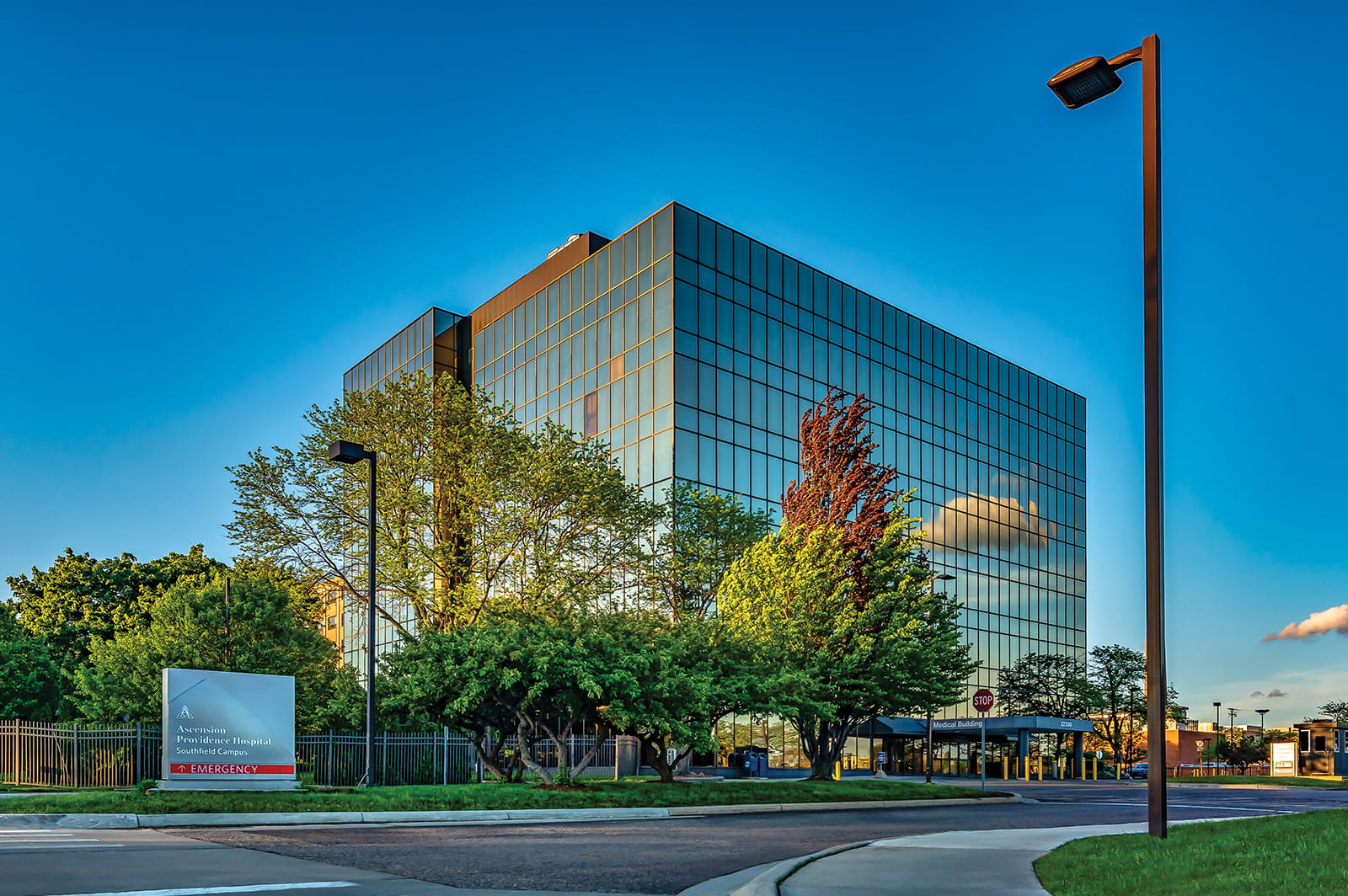We know that spine conditions affect your quality of life. We have designed our care to support you getting back to your family, loved ones, work and hobbies. Benefits of our spine surgery program include:
- A total focus on quality surgical care
- Highly trained and experienced surgeons and care teams
- Dedicated operating room and floor team with decades of expertise in spine procedures and care
- Designated private rooms for spine surgery patients
- A supportive physical therapy program for movement and walking after spine surgery
Whenever possible, we use minimally-invasive surgical techniques. With this type of surgery, small incisions are used. And, minimally invasive procedures may reduce your recovery time and lower your risk for complications.
- We conduct the highest number of minimally invasive spine cases in southeast Michigan
- Because of our surgeons’ training and knowledge, we have the ability to use minimally invasive spine surgery even for complex reconstruction cases
- We also conduct numerous spine revision surgeries to correct the problems of failed spine surgeries that took place elsewhere
- Fellowship-trained Neurosurgical and Orthopedic spine surgeons
Ascension Providence neurosurgical spine surgeons treat a full range of spine conditions — from the routine to complex. We listen to understand your health needs. Then we deliver the care that’s right for you. Common conditions include, but are not limited to:
- Arthritis and arthritis-like conditions of the spine
- Compression fractures of the spine
- Degenerative disc disease
- Exaggerated, forward rounding of the back (Kyphosis)
- Herniated discs
- Lower back pain (spondylolisthesis)
- Metastatic cancer of the spine
- Neck pain
- Osteoporosis
- Persistent pain in the back following back surgery
- Pinched nerve
- Sciatica
- Scoliosis
- Spinal infection
- Spinal stenosis
- Tailbone pain (coccyx pain)
- Whiplash
Specialty care for your brain
The neurosurgeons at Ascension Providence Hospital are leaders in brain surgery, stroke interventions and novel treatments for AVM, aneurysm, brain tumors and much more.
Comprehensive Stroke Center
Ascension Providence Hospital, Novi campus has earned the designation of "Comprehensive Stroke Center" by The Joint Commission, a national healthcare accreditation organization. Comprehensive Stroke Centers deliver advanced stroke care for even the most complex cases. Our neurologists, neurosurgeons, neuroradiologists, neuro-intensivists and rehabilitation specialists work together to deliver personalized, multi-specialty care. All Ascension Michigan hospitals are supported by the doctors and care teams of our stroke care network. This highly specialized stroke care helps support better outcomes at a time when you need it most.
Advanced minimally invasive endovascular procedures
Our endovascular neurosurgery teams provide treatment for conditions affecting the blood vessels that supply oxygen and nutrients to the brain and spinal cord. Endovascular surgical techniques are minimally invasive, requiring only a small incision, which may lead to faster recovery times, less risk of complications and therefore better outcomes. These procedures involve passing a catheter up your leg vessel to your brain to unclog your vessel, repair your brain aneurysm or vascular abnormality. We use this technique to bypass an open brain procedure, therefore, avoid retracting and pushing on your brain.
All endovascular neurosurgical procedures are performed by fellowship trained neurosurgeons and radiologists. This is a fast evolving field with new science and technology constantly being developed. Ascension Providence is in the forth front of this field.
Minimally invasive brain surgery program
Using advanced imaging to identify the important tracts in your brain and a scope to precisely access your brain lesions, we can access even deep-seated tumors and clots with much less handling of the rest of your brain tissue. These exoscopes are the latest technological hardware advancement. Together with the use of our advanced augmented reality microscope and specialized dyes like fluorescein, you will have a much better experience than traditional open brain surgery. You will have a smaller incision and a faster recovery.
Cerebrovascular and skull base surgery
Cerebrovascular conditions mostly involve vessels at the skull base. Certain brain tumors like the acoustic neuromas are also located at the skull base. Due to the very deep location, surgical treatments are often difficult requiring handling through large parts of the brain. Our multidisciplinary team consists of neurosurgeons and neuro-otologists. Our collaboration allows us to use different approaches, through the nose, back of the ear, even around the orbit in order to access these lesions with less handling of the brain tissue. Whenever possible, we use minimally invasive techniques. Our hospital performs the highest number of acoustic neuromas in the country.
Conditions treated
- Acoustic Neuroma
- Astrocytomas
- Brain Aneurysm
- Brain Tumor
- Cavernous Malformation of the Brain (Cavernous Angioma; Cavernoma)
- Cerebral Abscess (Brain Abscess)
- Cerebral Arteriovenous Malformation (AVM)
- Chiari Malformation
- Chronic Subdural Hematoma
- Hydrocephalus
- Meningiomas
- Metastatic Brain Tumors
- Myelopathy
- Normal Pressure Hydrocephalus (NPH)
- Occipital Neuralgia (Arnold's Neuralgia)
- Pituitary Tumor
- Pseudotumor Cerebri
- Removal of blood clots or stenting of cerebral arteries after stroke
- Subdural Hematoma (acute)
- Trigeminal Neuralgia (TN)
The Ascension Providence Hospital Michigan State University College of Human Medicine Neurosurgical Residency
Hospital residency programs are important for many reasons. They help in recruiting top physicians to the hospital for patient care, teaching and research; and they are also an important way for the hospital to be active with the latest care available. Our residency faculty are fellowship-trained neurosurgeons and orthopedic spine surgeons who are experienced in surgical education. This means you will receive care from physicians that are respected leaders in teaching new, upcoming physicians.
Hear what our patients are saying
